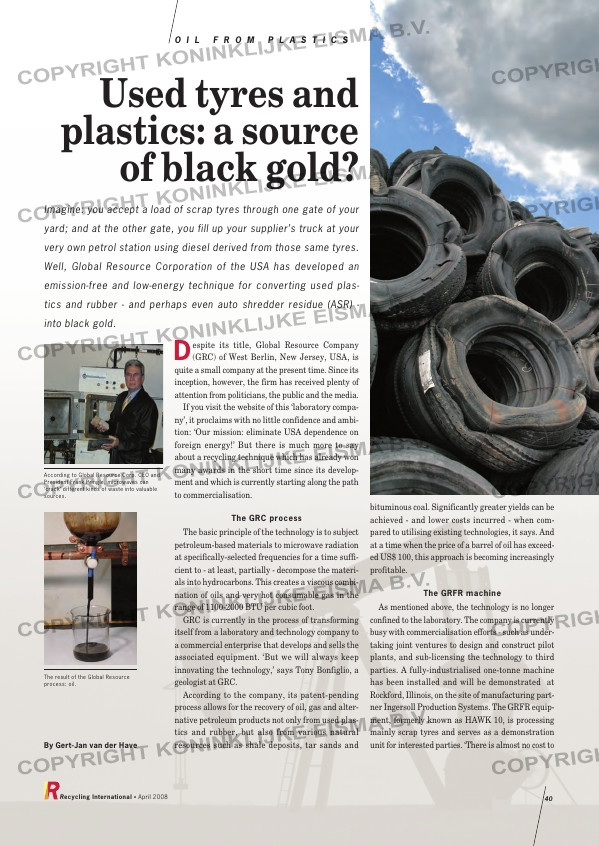Page 40 from: April 2008

D espite its title, Global Resource Company(GRC) of West Berlin, New Jersey, USA, is
quite a small company at the present time. Since its
inception, however, the firm has received plenty of
attention from politicians, the public and the media.
If you visit the website of this ‘laboratory compa-
ny’, it proclaims with no little confidence and ambi-
tion: ‘Our mission: eliminate USA dependence on
foreign energy!’ But there is much more to say
about a recycling technique which has already won
many awards in the short time since its develop-
ment and which is currently starting along the path
to commercialisation.
The GRC process
The basic principle of the technology is to subject
petroleum-based materials to microwave radiation
at specifically-selected frequencies for a time suffi-
cient to – at least, partially – decompose the materi-
als into hydrocarbons. This creates a viscous combi-
nation of oils and very hot consumable gas in the
range of 1100-2000 BTU per cubic foot.
GRC is currently in the process of transforming
itself from a laboratory and technology company to
a commercial enterprise that develops and sells the
associated equipment. ‘But we will always keep
innovating the technology,’ says Tony Bonfiglio, a
geologist at GRC.
According to the company, its patent-pending
process allows for the recovery of oil, gas and alter-
native petroleum products not only from used plas-
tics and rubber, but also from various natural
resources such as shale deposits, tar sands and
bituminous coal. Significantly greater yields can be
achieved – and lower costs incurred – when com-
pared to utilising existing technologies, it says. And
at a time when the price of a barrel of oil has exceed-
ed US$ 100, this approach is becoming increasingly
profitable.
The GRFR machine
As mentioned above, the technology is no longer
confined to the laboratory. The company is currently
busy with commercialisation efforts – such as under-
taking joint ventures to design and construct pilot
plants, and sub-licensing the technology to third
parties. A fully-industrialised one-tonne machine
has been installed and will be demonstrated at
Rockford, Illinois, on the site of manufacturing part-
ner Ingersoll Production Systems. The GRFR equip-
ment, formerly known as HAWK 10, is processing
mainly scrap tyres and serves as a demonstration
unit for interested parties. ‘There is almost no cost to
O I L F R O M P L A S T I C S
Recycling International • April 2008 40
Used tyres and
plastics: a source
of black gold?
Imagine: you accept a load of scrap tyres through one gate of your
yard; and at the other gate, you fill up your supplier’s truck at your
very own petrol station using diesel derived from those same tyres.
Well, Global Resource Corporation of the USA has developed an
emission-free and low-energy technique for converting used plas-
tics and rubber – and perhaps even auto shredder residue (ASR) –
into black gold.
By Gert-Jan van der Have
According to Global Resource Corp. CEO and
President Frank Pringle, microwaves can
‘crack’ different kinds of waste into valuable
sources.
The result of the Global Resource
process: oil.
RI_052 OIL plastic:Opmaak 1 03-04-2008 15:31 Pagina 40



